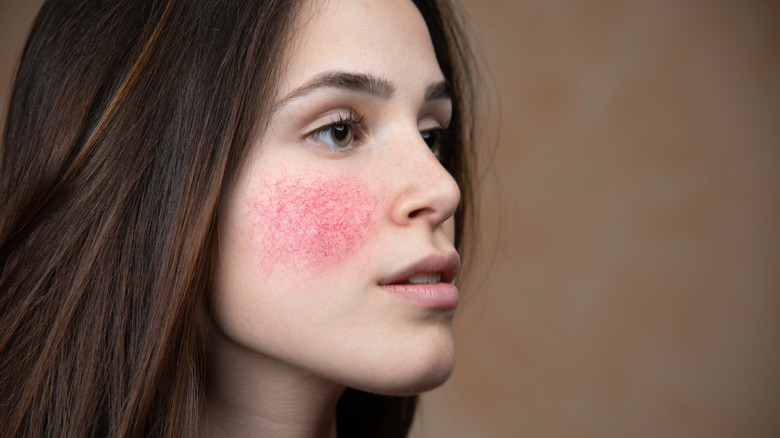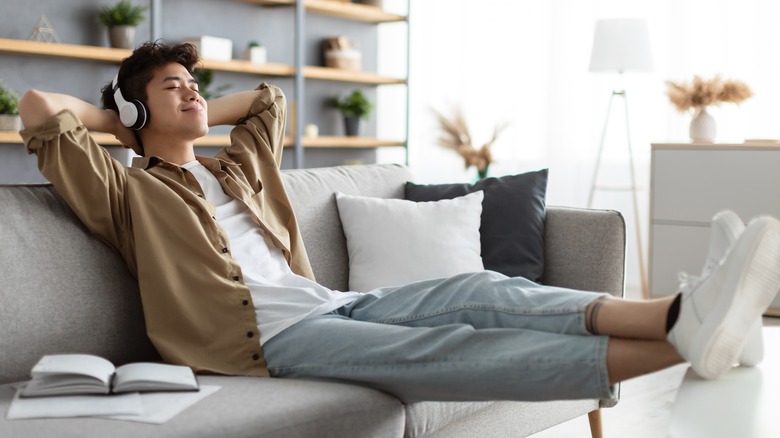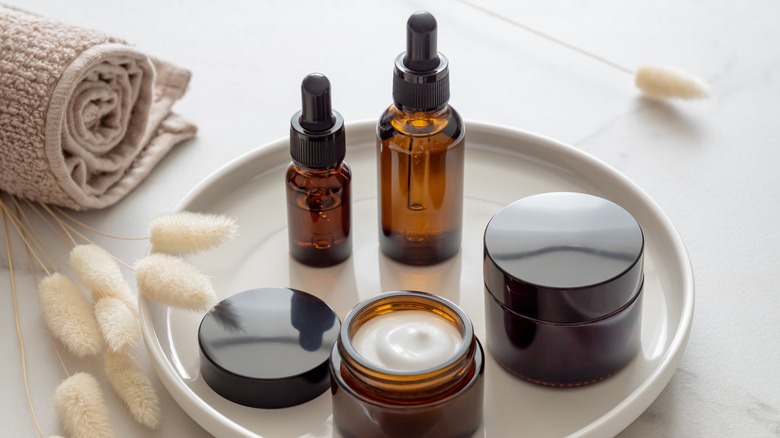5 Tips For Preventing Rosacea Flare-Ups
According to the National Rosacea Society, up to 415 million people worldwide have rosacea. Rosacea is a chronic skin condition. It normally affects the face and eyes, however, some people may experience rosacea symptoms in the neck, chest, and other areas, such as flushing and redness, according to Johns Hopkins Medicine. These signs and symptoms may flare up for weeks to months and then go away for a while, per Mayo Clinic.
While the causes of this condition are unknown, it seems certain that rosacea is not related to poor hygiene, and it's not contagious, per the National Health Service (NHS). While some theories associate rosacea with a blood vessel disorder, others believe the condition is caused by a fungus, skin mites, psychological factors, or the malfunctioning of some connective tissues (via Cleveland Clinic). Genetic factors can also trigger rosacea, per the National Institute of Arthritis and Musculoskeletal and Skin Diseases. According to the Institute, people with fair skin are more likely to develop the condition. Other rosacea triggers include food, weather, and emotional stress (via WebMD).
If you have rosacea, the condition might cause distress and disrupt your social relationships. However, you can take various measures to prevent flare-ups. Listed below are some vital prevention tips.
Prevent sun exposure
The sun has a two-sided relationship with the skin. According to Medline Plus, the skin requires an optimum amount of sunlight to manufacture vitamin D, which is vital in bone formation. However, there's a downside. The sun is the most common trigger for rosacea flare-ups, as noted by the National Rosacea Society. If you have rosacea, you may notice redness and flushing right after a brief episode in the sun, per the Society. Healthline reiterates this claim blaming an increase in body temperature, which dilates blood vessels, causing skin inflammation.
So how long can you stay in the sun if you're prone to rosacea? According to the American Academy of Dermatology Association, you might notice symptoms after a few minutes. They recommend staying out of the midday sun or covering up to prevent flare-ups. The application of odorless sunscreens that contain zinc oxide or titanium dioxide is also beneficial since they contain fewer irritants. Also, wearing wide-brimmed hats during the day reduces the chances of getting flare-ups.
Prevent stress
According to The American Institute of Stress, about 55% of Americans say they're stressed during the day. Chronic stress is associated with elevated cortisol production by the adrenal glands, which can seriously affect the cardiovascular and respiratory systems (via American Psychological Association). Interestingly, your skin can indicate health issues and can say a lot about your stress levels, according to Harvard Health Publishing. Acute and chronic stress can negatively affect overall skin health leading to various skin conditions, according to the source. Unsurprisingly, 79% of rosacea sufferers revealed that stress causes their rosacea to flare up (via National Rosacea Society). The stress-induced causes of flare-ups might vary. Interestingly, people with rosacea increasingly experienced flare-ups during the COVID-19 pandemic, as explained by the American Institute of Stress.
To keep your stress levels down, engaging in relaxing exercises such as meditation and tai chi might help, according to the American Academy of Dermatology Association. You can also join a rosacea support group to help leverage the experiences of other people with rosacea.
Reduce alcohol consumption
Alcohol has been identified as another trigger of rosacea flare-ups. According to a 2004 survey by the National Rosacea Society, it only took a single drink for people with rosacea to react. However, some alcoholic beverages might affect rosacea more than others. For example, red wine triggered flare-ups for more than 76% of the survey's respondents. As for white wine and champagne, they caused flare-ups in 56% and 33% of the respondents, respectively.
Does this mean you have to give up alcohol entirely? Not necessarily. It's important to speak to your doctor, who can advise on alcohol limits and help construct an ideal drinking schedule. As a guide, the American Academy of Dermatology Association advises adding soda or lemonade to alcoholic beverages to reduce the potency of alcoholic content. The organization further suggests that drinking a large glass of cold water after each drink may help reduce potency.
Reassess your medications
If none of the above triggers apply to you, your flare-ups might be a side effect of a medication you're taking.
According to Harvard Health Publishing, numerous prescription and over-the-counter drugs may lead to unexpected skin changes. The source identifies vasodilators, a type of blood pressure medication that widens the blood vessels, as a common trigger of acne and rosacea. Many experience worse flushing because such drugs may dilate blood vessels and increase blood flow, per Healthline. Also, some people have reported rosacea flare-ups after using topical steroids on their faces (via Healthline). Other medicines that cause flare-ups include those prescribed for anxiety, migraines, and glaucoma (via the American Academy of Dermatology Association).
If your medication is a trigger, it's best to discuss alternative treatments with a doctor. As a guide, if you must use topical steroids, the National Rosacea Society advises using a mild non-fluorinated steroid option or hydrocortisone.
Select rosacea-friendly cosmetic products
According to the American Academy of Dermatology Association, some harsh skincare products can cause rosacea to flare up. The main culprits are products that contain alcohol, camphor, fragrance, glycolic and lactic acids, menthol, and sodium lauryl sulfate. It helps to be mindful of these common rosacea irritants and opt for fragrance-free skincare and makeup products, as advised by the National Rosacea Society.
Besides products, your skincare habits may be responsible for your rosacea flare-ups. Excessive use of facial cleansers, makeup, and face masks are all potential triggers. According to a 2020 study published in the journal PLOS ONE, people with rosacea are more likely to experience flare-ups when using facial cleansers two times or more daily, wearing makeup more than six times a week, or applying facial masks more than four times weekly. The study authors advise using mild moisturizers and facial cleansers and wearing makeup in moderation.






